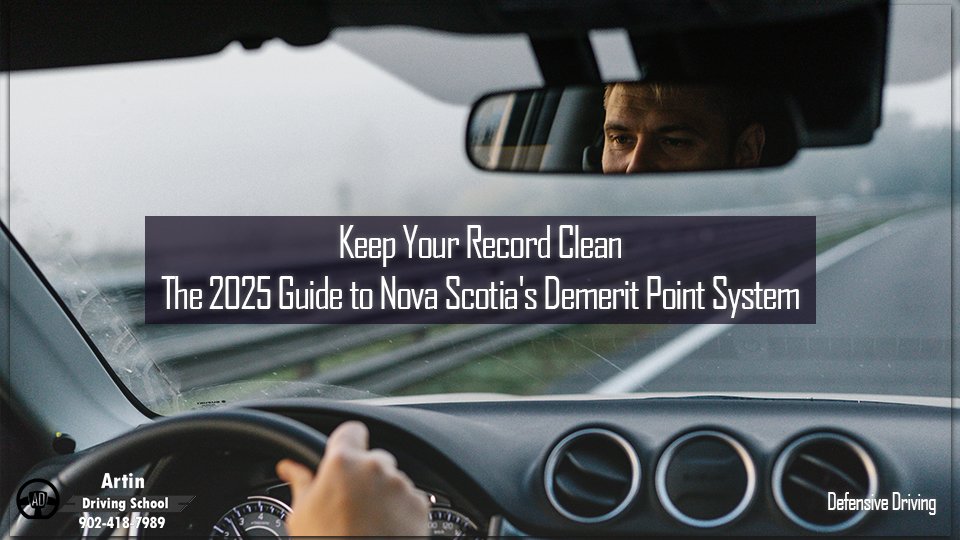Keep Your Record Clean: The 2025 Guide to Nova Scotia's Demerit Point System
Table of Contents
Safe driving in Nova Scotia is more than just good manners—it’s a legal requirement to keep your driving record clean and avoid costly fines, demerit points, and even licence suspensions. Whether you commute daily in Halifax, navigate busy Dartmouth streets, or travel on rural Bedford highways, understanding how the demerit point system works is crucial. This guide will help you save stress, money, and time by keeping points off your record.
What Is the Demerit Point System in Nova Scotia?
The Nova Scotia Registry of Motor Vehicles (RMV) uses a demerit point system to track unsafe driving convictions. When you are convicted of certain traffic offences, points are added to your driving record. Accumulate too many, and you risk driver interviews, restrictions, or a lengthy suspension.
Here are the demerit points for some common offences:
- Speeding 1–15 km/h over the limit: 2 points
- Speeding 16–30 km/h over the limit: 3 points
- Speeding 31+ km/h over the limit: 4 points
- Stunting (driving 50+ km/h over the limit): 6 points, an immediate roadside suspension, and a $2,422.50 fine
- Failing to yield to a pedestrian: 4 points
- Using a handheld device while driving: 4 points and a fine starting at $237.50 for a first offence (fines increase significantly for subsequent offences)
- Careless or dangerous driving: 6 points
If you accumulate 6 points, you will have to attend an interview with a Driver Enhancement Officer. At 10 points, your licence can be suspended for six months. For new drivers in the Graduated Driver Licensing (GDL) program, the rules are even stricter—your licence can be suspended with fewer points.
Why Avoiding Demerit Points Matters
Demerit points have consequences that go beyond the RMV.
- Insurance Increases: Most insurance providers will raise your premiums for several years after a conviction.
- Loss of Mobility: A suspension means relying on public transport, rideshares, or friends and family.
- Employment Risks: Many jobs, especially those involving company vehicles, require a clean driving record.
- Increased Crash Risk: The behaviours that earn points (speeding, distraction, impairment) are leading causes of collisions.
Seven Safe Driving Habits to Keep Your Record Clean
1. Drive at Safe Speeds—Always Adjust for Conditions
The posted speed limit is a maximum for ideal conditions. In rain, fog, or snow, the safe speed is much lower. The law requires you to drive at a speed that is safe for the current conditions.
On Highway 102 between Halifax and Bedford, black ice often forms in winter. Driving the posted 100 km/h limit could be considered unsafe and lead to a ticket.
2. Signal Every Intentional Move
Use your signals for all turns, lane changes, merges, and when exiting roundabouts. This prevents collisions and tickets for failure to signal.
3. Come to a Complete Stop
“Rolling stops” are a common and easily ticketed offence. You must come to a full and complete stop behind the stop line or crosswalk before proceeding.
4. Always Yield to Pedestrians
Nova Scotia law requires drivers to yield to pedestrians in both marked and unmarked crosswalks. Enforcement is very strict in pedestrian-heavy areas like downtown Halifax and near the Dartmouth ferry terminals.
5. Eliminate All Driving Distractions
Distracted driving is a major risk. Using a handheld phone is illegal, but so is any other activity that takes your attention off the road, like eating, programming a GPS, or attending to passengers. Set everything up before you start driving.
6. Never Drive Impaired
Driving under the influence of alcohol or drugs carries severe penalties, including immediate licence suspension, criminal charges, and 6 demerit points. For GDL drivers, a zero-tolerance policy is in effect.
7. Maintain a Safe Following Distance
Use the “two-second rule” in good weather and increase it to four seconds or more in rain, snow, or at night. Tailgating can lead to rear-end collisions and a charge for careless driving.
How to Check and Manage Your Demerit Points
Checking Your Points
You can request a copy of your Driver’s Abstract from Service Nova Scotia online or in person. This official record shows any demerit points currently on your licence.
Removing Your Points
If you have accumulated points, you have two primary options:
- Wait for them to expire.
- Take an approved Defensive Driving Course to remove up to four points.
The Defensive Driving Course is one of the fastest ways to clean up your record. Artin Driving School’s provincially approved program is recognized for demerit point reduction and for helping new drivers remove the “N” from their GDL licence.
Common Myths
Myth: Demerit points disappear if I pay my fine right away.
Fact: Paying the fine is an admission of guilt (a conviction). The points are added to your record after you pay and remain there until they expire.
Myth: Police only care about major offences.
Fact: Minor violations like failing to stop completely or not wearing a seatbelt are regularly enforced and carry demerit points.
Frequently Asked Questions (FAQ)
A mandatory 6-month licence suspension is imposed at different thresholds based on your licence type. The system is strictest for new drivers.
The suspension thresholds are:
- Fully Licensed Drivers (“All Others”): Suspension is mandatory at 10 points.
- Newly Licensed Drivers (GDL): Suspension is mandatory at 6 points.
- Learner’s Licence (GDL): Suspension is mandatory at 4 points.
How long do demerit points stay on my record in Nova Scotia? Points are removed from your driving record twenty-four months (two years) after the date of conviction. The conviction date is the day you pay the fine or are found guilty in court, not the day you received the ticket.
Yes. The Registrar may deduct up to four points from your record upon being satisfied that you have successfully completed an approved self-improvement defensive driving course within the preceding year.
Using a hand-held cellular telephone or engaging in text messaging while operating a vehicle is an offence under Section 100D of the Motor Vehicle Act. A conviction results in:
4 demerit points being added to your record. The fine for a first offence starts at $237.50 and increases for subsequent offences.
Yes. While the Motor Vehicle Act does not regulate insurance premiums, the traffic convictions that lead to demerit points are a primary factor that insurance companies use to assess risk and calculate your rates. Convictions on your record will almost certainly lead to an increase in your insurance premiums for several years.
Where to Enroll?
Safe driving habits protect your licence, your finances, and your life. By staying informed and driving defensively, you can enjoy the freedom of the road without worrying about points.
Ready to improve your skills? Enroll in Artin Driving School’s Defensive Driving Course today and drive with confidence.





